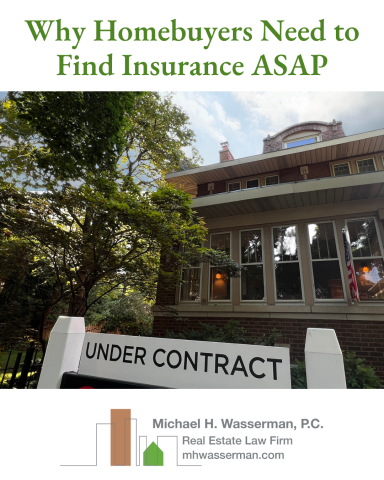When do buyers need to confirm they can get homeowners insurance?
Once a seller accepts your offer to buy their home, you'll want to secure homeowners insurance right away. But why so early? Can't it wait?
Keep in mind: You won't have to pay for the policy that early (mortgage lenders won't ask for proof of insurance until closer to closing). But you will need a declaration from an insurance company that confirms two things:
- It will insure the home.
- It will disclose the premium amount.
1. Securing homeowners insurance is a contingency in standard contracts.
By putting it off, you might give the seller an "out" and jeopardize your transaction. Here is the language in the widely used Multi-Board Residential Real Estate Contract 8.0:
HOMEOWNER INSURANCE: This Contract is contingent upon Buyer obtaining evidence of insurability for an Insurance Service Organization HO-3 or equivalent policy at standard premium rates within ten (10) Business Days after Date of Acceptance.
2. Lenders require it.
If you're applying for a mortgage, most lenders will require a declaration of insurability for loan approval. They also factor in the premium cost. Acting early gives you time to shop rates and help avoid future delays.
3. Not every home qualifies!
Insurance companies are getting more selective about which properties they'll insure. Even if you're paying cash for the home, you need to be confident it is insurable. If not, knowing right away may allow you to cancel the contract and find another property.
Why would an insurer deny coverage for a Chicago-area home?
Turns out, there are quite a few reasons. And since we are not insurance experts, we spoke to Dave Frederickson, a Chicago-area State Farm agent for more than 30 years. He shared this helpful information.
Reasons a home (or buyer) might not be insurable:
The roof's condition.
According to Dave, replacing a roof is like replacing tires on a car—it's basic upkeep that the seller should have done. "You don't wait for an accident to get new tires," he said. "And insurers don't want you to wait for a hailstorm to get a new roof."
Overall condition of the home.
Deferred maintenance can be a red flag. "Insurance companies look for things like peeling paint, rotting trim, broken or boarded windows, an abundance of debris in the yard/near the building."
How can an insurer see the condition of the home? He answered, "It can be discovered in the inspection report or by the agent's inspection. Some underwriters also look at overhead photography obtained by fixed-wing aircraft."
Buyer's claim history.
Insurance claim histories stay on file for five years. Insurers might pass on buyers with multiple past claims. Dave said, "Claims should be for catastrophes, not nuisances. Avoid filing a $700 claim for a $500 deductible." Calling around may not help—insurance companies share claim history data.
Credit history.
Insurers use different (and often proprietary) formulas than lenders. While lenders focus on credit score, insurers review broader credit history.
What reasons can't insurers use to deny coverage?
Flooding.
Flood insurance is handled through FEMA. "If the home is in a flood plain," Dave said, "it's up to the lender to confirm that. But keep in mind, flood damage is different from sewer or drain backup—those are usually covered by homeowners insurance."
The neighborhood.
It's illegal to deny coverage based on ZIP code or area. Dave added, "Premiums can reflect neighborhood risk factors, like high crime or high claim volume. Coverage is available—it may just cost more."
The seller's claim history.
"Insurers typically can't access the previous owner's claims history, even using the home's address." He said.
Bonus! Dave shared three tips for new homebuyers and insurance.
Bundle your coverage.
"It makes sense to bundle car and homeowners insurance," Dave said. "It gives you leverage. If you already have auto insurance, talk to that provider first."
Get renters insurance early.
"If you rent, get a renters policy well before you start house-hunting. It builds history—and a little leverage."
Don't skip life or disability coverage.
"A mortgage is one of the biggest debts most people take on. Make sure you have adequate life or disability insurance in place.
Special thanks to Dave Frederickson for his time and expertise! To connect with him, call his Edgewater office at 773-761-4242.
Ready to buy in the Chicago area?
Reach out to our law firm early in the process. We can help you confidently navigate every step—from buyer-broker agreements to the final closing. Real estate closings are all we do.
When you subscribe to the blog, we will send you an e-mail when there are new updates on the site so you wouldn't miss them.

